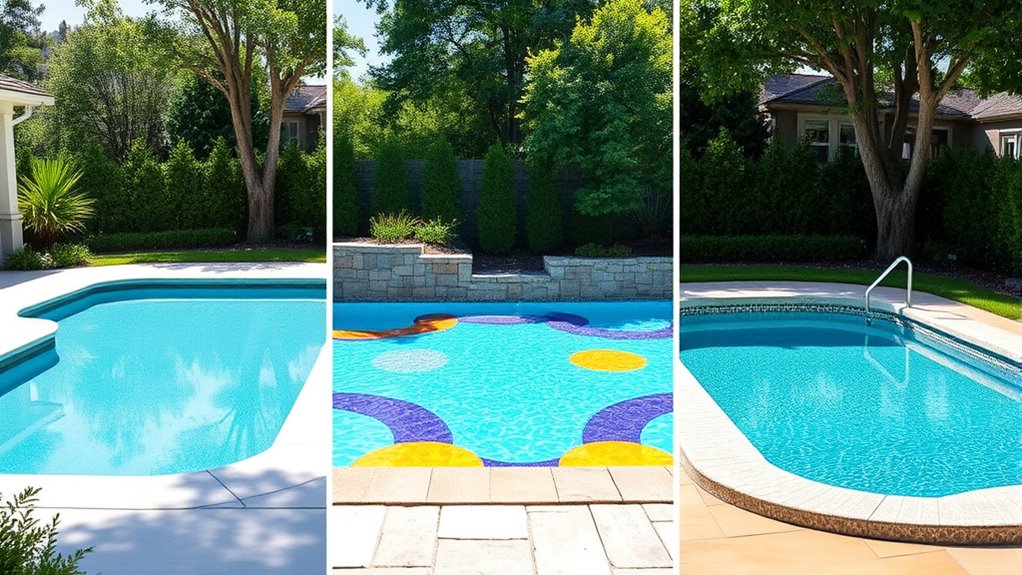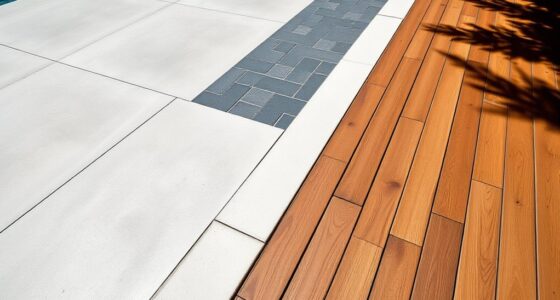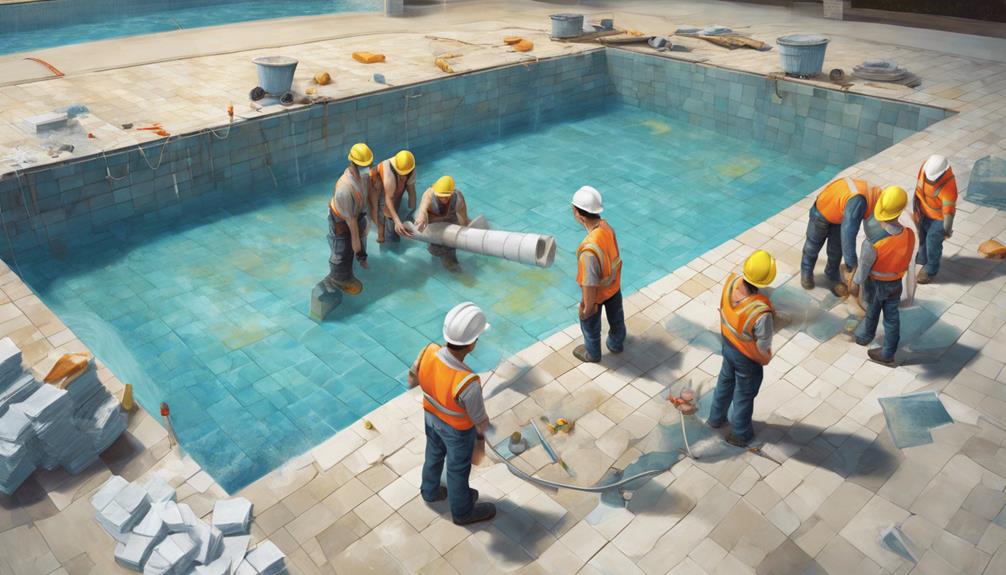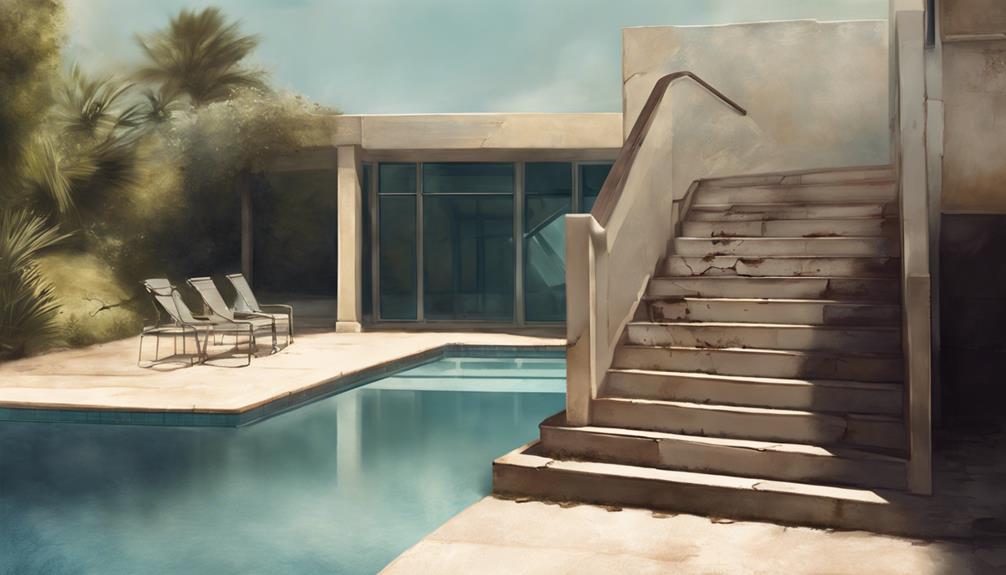When choosing a backyard pool, you can opt for concrete, vinyl, or fiberglass, each with distinct advantages. Concrete pools offer custom shapes and durability but require more maintenance and safety measures. Vinyl pools are affordable, quick to install, and easier to care for, with replaceable liners. Fiberglass pools are pre-made, low maintenance, and safe, especially for families. Continue exploring to find the perfect fit for your backyard and lifestyle.
Key Takeaways
- Concrete pools are highly customizable and durable but require ongoing maintenance and safety measures.
- Vinyl liner pools are more affordable, easier to maintain, and feature smooth surfaces with replaceable liners.
- Fiberglass pools are quick to install, low-maintenance, and have non-porous surfaces that resist algae.
- Safety features like barriers and alarms are essential for larger or deeper pools, especially concrete options.
- Choose a pool type based on budget, maintenance willingness, safety needs, and desired customization level.
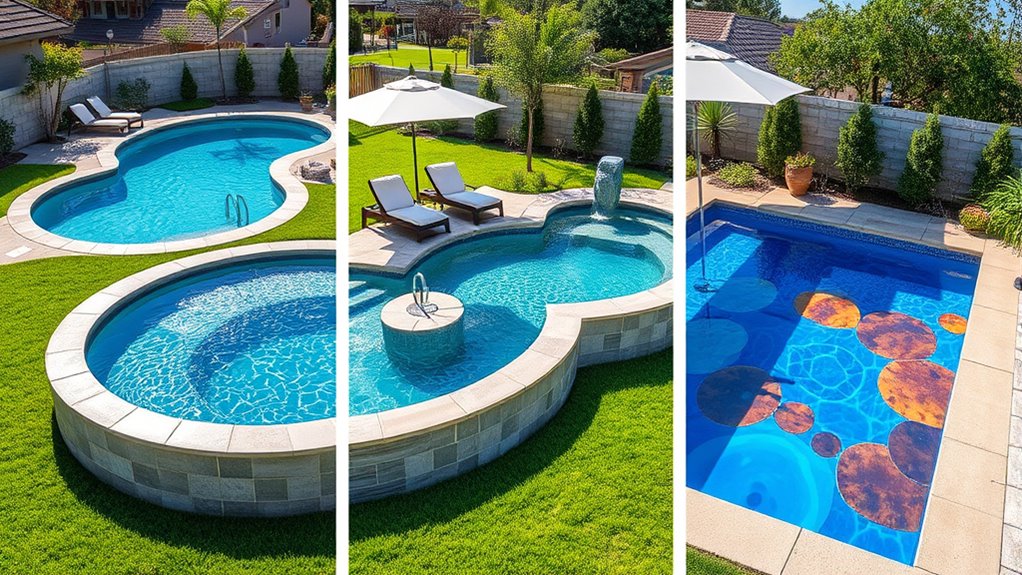
Backyard Pool Types
Are you wondering which backyard pool type suits your space and lifestyle? Choosing the right pool involves more than just aesthetics; you need to consider how much effort you’re willing to put into pool maintenance and the safety features you require. Each pool type—concrete, vinyl, and fiberglass—offers distinct advantages and challenges that can impact your decision.
Concrete pools are incredibly durable and customizable, making them a popular choice for homeowners who want a unique design. You can shape them to fit your yard perfectly and add features like waterfalls or built-in seating. However, they demand more ongoing pool maintenance because the surface is porous and prone to algae buildup if not properly maintained. The surface also requires periodic resurfacing, which adds to maintenance costs. Safety features are essential with concrete pools since their rough surface can cause scrapes, and the sharp edges around the coping need to be smoothed to prevent injuries. Additionally, because concrete pools are often larger and deeper, you should install safety barriers and alarms to prevent accidents, especially if children are around. Regular cleaning and chemical balancing are crucial to keep the porous surface in good condition.
Concrete pools are highly durable and customizable but require regular maintenance and safety features.
Vinyl liner pools are generally more affordable upfront and quicker to install than concrete options. The smooth vinyl surface feels gentle on your skin and is easier to clean, reducing your pool maintenance workload. The liners are replaceable, so if they get punctured or stained, you can swap them out without replacing the entire shell. Safety features are straightforward to incorporate, with options like pool covers, alarms, and fencing to keep kids safe. Since vinyl pools tend to be smaller and less deep, they can be a safer choice for families concerned about drowning risks. Regularly inspecting the liner and maintaining proper chemical levels are essential to prevent algae growth and ensure the pool remains safe and clean. Proper maintenance can extend the lifespan of your vinyl liner and keep your pool safe.
Fiberglass pools are pre-molded and installed quickly, making them a low-maintenance option. Their non-porous surface resists algae and stains, which means less scrubbing and fewer chemicals needed for pool maintenance. They typically come with built-in safety features such as textured surfaces for slip resistance, and their smooth finish minimizes injury risks. Because they’re factory-produced, they’re less customizable but often more reliable over the long term. The shallow depth of many fiberglass pools also contributes to safety, especially for families with young children. Their durability means fewer repairs and less worry about structural issues, but it’s still essential to install safety features like fencing and alarms to prevent accidental drownings. Many fiberglass pools are available through ultra-beauty store hours, making them accessible for installation and maintenance scheduling.
Frequently Asked Questions
Which Pool Type Is Most Eco-Friendly?
You’ll find fiberglass pools are the most eco-friendly option, thanks to their durable, sustainable materials that last longer and require less maintenance. Did you know they typically use 30% fewer chemicals? Choosing eco-friendly options means reducing your environmental footprint. Fiberglass pools need fewer repairs and less energy for heating, making them a smarter, sustainable choice. So, if you want a greener backyard, fiberglass is your best bet.
How Long Does Each Pool Type Last?
You’ll find that concrete pools last the longest, often 25-50 years, thanks to their durability and eco-conscious materials. Fiberglass pools typically last 20-30 years, offering good durability with less maintenance. Vinyl pools tend to last 10-15 years, but they’re more budget-friendly. Your choice depends on how long you want your pool to serve you and your preference for eco-friendly materials that support sustainability.
Are There Any Health Risks Associated With These Pools?
Are you aware of potential health risks with pools? You should be, especially since improper pool chemical safety and faulty water filtration systems can cause skin irritations, respiratory issues, or infections. Regularly maintaining your pool, balancing chemicals correctly, and ensuring your filtration system works properly greatly reduce these risks. Stay vigilant and prioritize safety, so your swimming experience remains fun and healthy without unwanted health concerns.
What Maintenance Is Required for Each Pool Type?
You need to regularly maintain your pool by performing pool cleaning and chemical balancing. For concrete pools, you’ll need to scrub surfaces and monitor pH levels frequently. Vinyl pools require gentle cleaning to avoid tears and consistent chemical checks. Fiberglass pools are low maintenance but still need routine cleaning and chemical balancing to prevent algae and maintain water clarity. Consistent care keeps your pool safe and inviting.
Can These Pools Be Customized in Shape and Size?
Yes, you can customize your pool’s shape and size, but the level of pool customization varies. Concrete pools offer the most shape flexibility, allowing you to create unique designs tailored to your backyard. Vinyl pools have some customization options, mainly in size and basic shapes, but are less flexible. Fiberglass pools come pre-made, so shape flexibility is limited, but you can choose from various sizes and models to fit your space.
Conclusion
Think of choosing a backyard pool like picking your perfect garden—each type is its own vibrant flower. Concrete offers bold, customizable blooms; vinyl is like a delicate, adaptable blossom; fiberglass resembles a sturdy, effortless rose. Whichever you select, you’re creating a tranquil oasis in your personal garden. Your dream backyard pool is waiting—just like a beautiful flower ready to bloom, it’s all about what fits your style and needs best.

